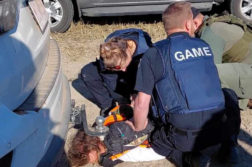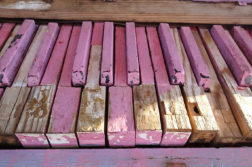The colourful ramp ceremonies for the Australian diggers returning in flag-draped coffins from the front lines of Afghanistan are graphic, poignant and heart-rending. Australia is paying a horrible price for a war it can never win.
And that price will take decades to pay: shattered lives, shattered families and shattered communities dealing with drug abuse, alcohol abuse, and all the violence and dysfunction that are the often misunderstood and misdiagnosed aftermath of war.
Statistically, about 40 per cent of Afghanistan veterans will suffer Post Traumatic Stress Disorder (PTSD), the invisible wound.
But anecdotally, living and working with serving and ex-serving soldiers from Australia, New Zealand, the UK, Russia, America, Afghanistan, Iraq, India, Pakistan, Israel, Georgia and Azerbaijan the percentage looks more like 100 per cent.
"No one gets it," says a friend with whom I was in treatment, an East Timor veteran who was with the first squad into Dili after a night at the faeces-covered airport. "Unless you’ve been there."
His team had to march past thousands of angry and humiliated Indonesian troops, clearing the roads. A truck driver shoved two guns in his face. To respond with fire would likely have prompted the Indonesians to open fire on his outnumbered team.
And if he didn’t respond he risked having his head blown off. Luckily a comrade circled the truck and dragged the driver out from the passenger side. In his tour, his men lost 40 per cent of their body weight and were down to 20 per cent of fighting capacity.
Simply unable physically and mentally to fight any longer, they were pulled out early.
We talked long into the night comparing notes at the Heidelberg Repatriation Hospital in Melbourne. With the support of Columbia University’s DART foundation for trauma-affected journalists, I had been admitted to a treatment program largely reserved for veterans.
I had gone in with that first wave of INTERFET troops and my friend and I worked out I must have seen him and his comrades preparing to pull out of the airport for Dili.
"Yeah, I remember that bridge and that river bed. ABRI [the Indonesian military]watching and poised." He obsessively drew maps and diagrams as we talked into the morning, well after lights out in Ward 17.
Most PTSD victims don’t talk a lot about the experiences that bring them to treatment. The lost mates. The trauma. The mess their lives become when they come "home".
Many don’t even know they have PTSD. Here’s the thing about mental illness of any kind: When you break your leg, your brain tells you it hurts, something is wrong and needs attention. But what when you break your brain?
It’s a communications blackout.
"I know there’s something wrong with me," says another friend, a former British army colour sergeant, as we sit over a ration meal on a course in the countryside near Aldershot, the home of the British army. "But I don’t know what. And I have no fucking idea how to fix it. Everything’s a total mess."
Until his recent retirement, he was charged with the "death knock" — knocking on doors to tell families their husband, son, father, brother, daughter, sister, mother, wife had been killed in Afghanistan or Iraq. "They gave me no training for this. No support. I just couldn’t deal with it. It cut me to pieces," he says, fighting back tears.
Says an ethnic Russian Azeri friend who fought as a conscript against Armenia in Nagorno-Karabakh: "We’re all fucked in the head. We can never be normal again. And what is normal, anyway? I don’t fucking know." For him, the answer lies only in vodka and his guitar on the shores of the Caspian in old Baku.
The medical profession has recognised what is called vicarious PTSD: a silly phrase that recognises people can get PTSD just by hearing about the experiences of others. That’s why psychiatrists, psychologists and counsellors in countries such as Australia are required to undergo compulsory counselling themselves.
PTSD brings substance abuse, binge spending (which can lead to massive debt), broken relationships, violence, depression and unemployment.
Some of the men I was in treatment with in Heidelberg are Vietnam war veterans. More than 35 years on, they have not recovered their lives. Most have had run-ins with the law. Some boast, as much in shame as in pride, about how it takes more police to subdue a violent vet than an ordinary person.
The favourite movie in Ward 17 was a Veterans’ Affairs Department Vietnam-era DVD "You’re Not in the Military Now". It’s as valid for Australia’s new generation of Afghanistan and Iraq veterans as it was for their predecessors. It points out, in graphic detail, how soldiers are basically instilled with elements of PTSD before they even go into the field, aggression and exaggerated startle response (jumping at the slightest sound or movement) among them.
"There’s a world of silence between those who have seen unspeakable acts of violence and those who have not," says the trailer for the documentary about Australian veterans and PTSD, "Casualties of War".
Veterans have to deal not only with their trauma, but a sometimes hostile reception when they come home. "And it wasn’t just, you know, people you don’t know," says former special forces soldier "Leigh" in the documentary. "It’s your family as well."
"You know, I’ve had friends I’ve known for 18 years say you used to be hard, now you’re a fucking pussy. And you’ve gotta sit there an go, well you’re a fucking electrician — I’m a fucking special forces paratrooper motherfucker, where do you get off fucking doing that.
"But you can’t. Because if he goes ‘aw what’, I’m gonna upper-cut him and break his fucking neck."
Care for Australia’s veterans is appallingly inadequate. There are not enough resources. There is not enough effort put into identifying those in trouble. And what treatment there is is little more than medication and basket-weaving.
Worse, there is no support at all for families who bear the brunt of their suffering and at times brutal and appalling behaviour.
Homelessness is a major problem. And for the homeless in Australia, it’s tough to be white and of working age. The shelters are all geared to the elderly, the sick and abused mothers and children. I called the Uniting Church’s "crisis" centre and was told to camp in the bush for almost a week until after they reopened following Easter. Instead, I checked in to A&E at the local hospital.
A University of Melbourne study estimates the annual extra health costs for Vietnam veterans alone, in 1996, at more than half a billion dollars. Many of my friends in Ward 17 have been here several times and will return — at $5,000 a week, paid for by taxpayers.
"I’ll never get out of this," says a veteran of Iraq and Afghanistan. "This is my life now. I have to learn just how to cope. I can’t learn how to live. I go out, I last a while. Then I have to come back. I have no control."
Like this article? Register as a New Matilda user here. It’s free! We’ll send you a bi-weekly email keeping you up to date with new stories on the site. And you can like New Matilda on Facebook here.
Want more independent media? New Matilda stays online thanks to reader donations. To become a financial supporter, click here.
Donate To New Matilda
New Matilda is a small, independent media outlet. We survive through reader contributions, and never losing a lawsuit. If you got something from this article, giving something back helps us to continue speaking truth to power. Every little bit counts.



